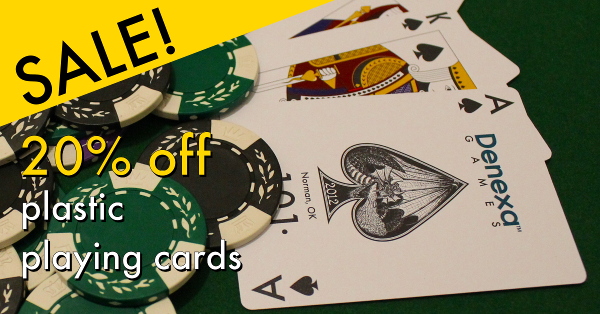Pepper
Pepper is a trick-taking game similar to Euchre, played in Ohio and Iowa. Though it’s quite a bit simpler and easier to learn than Euchre, it still provides ample opportunity for the use of cunning strategy. Pepper is best as a four-player partnership game, though variants for two and three players exist.
Object of Pepper
The object of Pepper is to accurately predict the number of tricks that you will capture in a hand if allowed to select the trump suit, or to stop your opponents from capturing the number of tricks they need.
Setup
Pepper is played with a stripped 24-card deck. Starting from a deck of Denexa 100% Plastic Playing Cards, remove all the 2s through 8s, leaving you with 9s through aces (six cards) in each of the four suits. You will also need something to keep score with. Pencil and paper works well.
Shuffle and deal six cards to each player.
Rank of cards
Pepper uses an unusual ranking of cards, although it will be familiar to those who have played Euchre or Five Hundred. In non-trump suits, cards rank in the conventional order, i.e., from highest to lowest: A, K, Q, J, 10, 9.
In the trump suit, however, the cards rank differently. The jack of the trump suit is called the right bower, and the jack of the same color of the trump suit is called the left bower. (For example, if the trump suit were diamonds, the J♦ would be the right bower and the J♥ would be the left bower.) Both are considered part of the trump suit, ranking above all other cards in that suit. The complete rank of cards in the trump suit, then, is right bower (J), left bower, K, Q, 10, 9.
Game play
Bidding
Each hand begins with the bid, where the players compete for the right to choose the trump suit. The available bids are the numbers one through five, signifying an intent for their partnership to collect one to five tricks respectively, and bids of little pepper and big pepper, which are both bids to collect all six tricks. A bid of big pepper, which is higher than little pepper, essentially doubles the potential risk or reward to the partnership.
Bidding starts with the player to the left of the dealer, who may make any of the bids described above, or pass. Each bid must be higher than the bids preceding it. Bidding continues until there are three consecutive passes. The high bid becomes the contract for that player’s partnership. The high bidder’s partnership becomes the declarers, and the opposing side the defenders. The high bidder may name any of the four suits as trump, or declare there will be no trump for that hand.
Play of the hand
The high bidder leads to the first trick. Players must follow suit if able; if not, they may play any card, including a trump. The trick is won by the highest card of the suit led, unless a trump was played to that trick, in which case the highest trump takes the trick.
Captured tricks are not added to the hand. Instead, all of the tricks a partnership takes are kept in a combined pile in front of one of the partners. To speed scoring at the end of the hand, it’s a good idea to keep the tricks separate somehow, like by turning each trick at right angles to the previous one before putting it on the pile.
Scoring
After all six tricks have been played, the hand is scored. If the declarers made their contract (i.e. they captured the number of tricks bid or more), they score one point for each trick taken by the partnership. If they failed to make the contract, they lose six points, regardless of the amount of the contract. If the high bid was big pepper, the partnership scores twelve points for taking all six tricks and loses twelve if they did not. The defenders score one point for each trick taken.
Game play continues until one partnership scores 30 points or more. Whichever partnership has the higher score at that point is the winner. If the score is tied, the game ends as a draw.
Variants for two and three players
Pepper can also be played with two or three players without partnerships. In both cases, three eight-card hands are dealt; in the two-handed variant, one of these is discarded unused. Bids in this version go up to seven, with the pepper bids representing an intent to take all eight tricks.
Failure to make a contract results in the loss of eight points. A successful big pepper bid scores sixteen points, while an unsuccessful one sets the player back sixteen points.




Trying to learn, but confused. My friends play “no trump” Nines. Then they run up a suite from the nine to ace. And it is still trump in that suite. Even if you play another nine. I have not been able to find any rules that speak of this rule. Is there a whole complete set of rules that I have not found yet?
Hey Chris,
One of the things that makes card games so much fun is that it’s possible for every group of players to customize the rules to their group. It sounds like that may have been what your group has done. The important thing is that the rule is clear to everyone and stays consistent from hand.